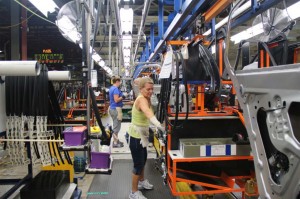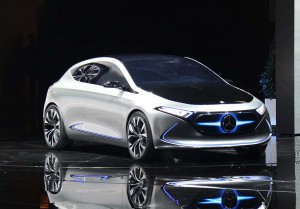If you’re looking for a job at an auto assembly plant, hang tight, there will be thousands of new openings over the next several years. But for now, you might want to look elsewhere.
The auto industry was one of the sparks that helped set fire to the U.S. economy after the Great Recession, and since just the beginning of the year, manufacturers ranging BMW to Volvo have announced plans to add at least 12,000 new jobs as they add new U.S. assembly plants or expand existing ones.
But that doesn’t necessarily bode well in the near-term. GM, which has said it will add 1,500 new jobs over the next several years, has some more immediate bad news, the automaker announcing it will trim the overnight shift at its assembly plant in Spring Hill, Tennessee. It’s the latest in a series of short-term and indefinite cutbacks resulting from the ongoing slowdown in U.S. car sales.
It’s been said that when the economy catches a cold the auto industry gets pneumonia, and that was clearly the case leading into the devastating recession that began this decade. But the industry also proved to be the engine that could, helping drag the nation back into recovery – and not only restoring but creating tens of thousands of new jobs in the process.
Many of those came as companies like General Motors, Ford and Fiat Chrysler called back laid-off workers, but there was also a burst of plant construction under former President Obama. And that is continuing under the new administration.
BMW, for example, will invest $600 million in its sprawling assembly complex in Spartanburg, South Carolina – the June announcement coming just a year after the Bavarian automaker completed a $1 billion expansion of that factory. It will result in the creation of another 1,000 jobs. The investment will, among other things, permit the production of the next-generation X3 sport-utility vehicle. And it will turn Spartanburg into the single-largest automotive export site in the country.
(Click Here for more on BMW’s latest announcement.)
Then there’s Toyota which recently announced that it will partner with erstwhile Japanese rival Mazda to set up a new assembly plant somewhere in the U.S. The two carmakers are currently engaged in a site search, with a number of states chasing the $1 billion project. It is expected to produce a number of different models, including a new generation of battery-electric vehicles likely to use breakthrough solid-state batteries. The partners did say they expect to create about 4,000 new jobs at the plant.
(Click Here for more on the Toyota-Mazda project.)
Volvo has been in the midst of a growth spurt since being acquired by China’s Zhejiang Geely Holding Group in 2010. The parent has funded two Chinese assembly plants and a third new factory – the Swedish brand’s first in the U.S. – will open in Charleston, South Carolina next year. While company officials haven’t officially confirmed the reports, sources have revealed that Volvo already has decided to double the size of the initial plant, which will bring to about 2,500 the total number of jobs being created in the state.
(Volvo set to double size of Charleston plant. Click Here for details.)

Shorter-term, a lot of U.S. auto jobs could be cut at places like this GM plant in Spring, Hill, TN as domestic sales continue to slide.
Many of the new automotive plant plans are targeting the largely non-unionized South. And South Carolina has been grabbing a large share of the spoils. That includes a new Mercedes-Benz Sprinter van plant that was announced last year just outside of Charleston.
Just last week, Mercedes laid out additional growth plans for its complex in Tuscaloosa, Alabama. It will invest $1 billion there to allow it to produce both batteries and new battery-electric SUVs, creating 600 new jobs.
(For more on the Mercedes plans, Click Here.)
Since January, additional expansion announcements have come from Fiat Chrysler Automobiles, Honda and General Motors, the three planning to create 2,000, 300 and 1,500 new jobs, respectively. Hyundai and Ford have also announced expansion plans but have yet to provide details on the jobs they will create.
All told, that means at least 12,500 new auto jobs will be added at the new or expanded facilities, according to the Reuters news service, with collective investments of at least $9.5 billion.
(GM dropping shift at another plant as sales stall. Click Here for the latest.)
That’s the good news. The bad news is that GM alone has now dropped shifts at nine plants since last November, and the domestic giant and its crows-town rivals have all made a number of shorter-term cutbacks in recent months to respond to sliding car sales. Ford last week said it would temporarily idle five U.S. and Mexican plants in the coming weeks, impacting as many as 15,000 workers. Barring a sudden upturn in U.S. sales, industry analysts expect still more of these moves to keep production in line with demand.
So, for those working in the auto industry or seeking jobs, the short-term prospect appears risky, but the long-term outlook is significantly better.
(For more on the cutbacks at Ford, Click Here.)


